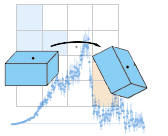
| HOME | PEOPLE | RESEARCH | ACADEMICS | TRAVEL/VISITORS | LINKS | CONTACT |

|
Web Mail
Mailing Lists
Computing Resources
Site Map
Arnold Diffusion: What It Is, What Is Known, and What It Not Known
Dr. Stephen Wiggins, CDS, Caltech
Monday, October 6, 199711:00 AM to 12:00 PM
Steele 102
A central question in the study of near integrable analytic Hamiltonian systems is the stability of the action variables. The KAM theorem gives a partial answer to this question, insuring that under general conditions, the action variables are stable for most initial conditions. For those initial conditions not covered by the KAM theorem, Nekhoroshev's theorem provides an upper bound on the evolution of the action variables for finite times that are exponentially long with respect to the perturbation parameter.
In 1964 Arnold published an example of a three degree-of-freedom Hamiltonian system containing a mechanism for a global instability of the action variables which has come to be known as Arnold diffusion. It has never been proven that Arnold's mechanism occurs in generic Hamiltonian systems, and rigorous existence proofs of this mechanism for model problems have only appeared in the last four years or so. In the last five years research activity in this area has increased dramatically. In this talk I will discuss Arnold's original example as a means of identifying the main difficulties in the subject, survey the known results, discuss future directions for research, and raise the question as to whether there is any hope at all of "solving" the problem., Caltech
A central question in the study of near integrable analytic Hamiltonian systems is the stability of the action variables. The KAM theorem gives a partial answer to this question, insuring that under general conditions, the action variables are stable for most initial conditions. For those initial conditions not covered by the KAM theorem, Nekhoroshev's theorem provides an upper bound on the evolution of the action variables for finite times that are exponentially long with respect to the perturbation parameter.
In 1964 Arnold published an example of a three degree-of-freedom Hamiltonian system containing a mechanism for a global instability of the action variables which has come to be known as Arnold diffusion. It has never been proven that Arnold's mechanism occurs in generic Hamiltonian systems, and rigorous existence proofs of this mechanism for model problems have only appeared in the last four years or so. In the last five years research activity in this area has increased dramatically. In this talk I will discuss Arnold's original example as a means of identifying the main difficulties in the subject, survey the known results, discuss future directions for research, and raise the question as to whether there is any hope at all of "solving" the problem.
|
©2003-2011 California Institute of Technology. All Rights Reserved webmaster |
|